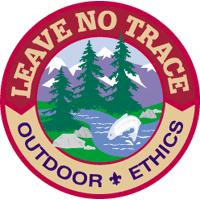
Considerate of Others

It is our task in our time and in our generation, to hand down undiminished to those who come after us, as was handed down to us by those who went before, the natural wealth and beauty which is ours. |
 A wilderness adventure makes me think of long miles of carrying a pack through country where I'll see great scenery, lots of animals, and no other humans. With the ever-growing population of outdoors enthusiasts, it is no longer realistic to expect to see no other humans in most parts of the country, especially those that have a reputation of being particularly beautiful.
A wilderness adventure makes me think of long miles of carrying a pack through country where I'll see great scenery, lots of animals, and no other humans. With the ever-growing population of outdoors enthusiasts, it is no longer realistic to expect to see no other humans in most parts of the country, especially those that have a reputation of being particularly beautiful.
So, it becomes necessary to prepare for the inevitable encounter with other visitors. When I do meet up with another group of backpackers, pair of mountain bikers, or string of horses, I need to have a plan for what I'll do and how I'll act. This is the basic way I can be more considerate of others in my efforts to leave no trace of my passing.
Courtesy towards others is a very important component of outdoor ethics. The seven principles of Leave No Trace are all intended to help preserve the wild spaces for other visitors, whether it's those in the outdoors with us now or those that will want to experience it in the future. By being courteous and considerate of others, we help promote ethical use and stewardship of the land.
There are three categories of 'Other Visitors' - those in our own group, those in other groups we meet, and future users. All of the LNT principles are geared at conserving recreational areas for future users. People in other groups are the main target for this principle, but people in your own group will also have a much better experience by considering these ways to be considerate:
-
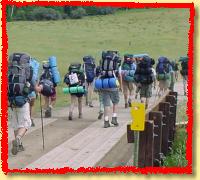 Group Size - A smaller group not only leaves less of a physical impact, it also feels more like an adventure and less like a crowd.
Group Size - A smaller group not only leaves less of a physical impact, it also feels more like an adventure and less like a crowd.
The people in a smaller group tend to have a better experience and they have less impact on other groups. A smaller group can find more isolated camping spots, make less noise, and travel faster. Surveys of visitors show that encountering several smaller groups is preferred over running into one large group.
Have your large group break into smaller groups that hike and camp separately. - Campsite Selection - Tucking your tents away off the trail and in a secluded area allows others hiking on the trail to enjoy the unspoiled views and scenery. Try to find a place screened by trees or rocks and far from any other groups.
-
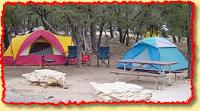 Colors - Neutral colors help minimize the visual impact you have on others. Instead of bright yellow tents, use grey, green, or blue. Use a tan backpack cover and save the hunter orange one for hunting season. Consider the colors of your clothing and plan to wear earth-tones. This will help your group seem smaller and less noticable, especially in open areas where there is little forest cover.
Colors - Neutral colors help minimize the visual impact you have on others. Instead of bright yellow tents, use grey, green, or blue. Use a tan backpack cover and save the hunter orange one for hunting season. Consider the colors of your clothing and plan to wear earth-tones. This will help your group seem smaller and less noticable, especially in open areas where there is little forest cover. - Noise - The sounds of nature don't include music, a cellphone ringing, or people yelling between camp sites. Preserve the experience for others by leaving electronics at home and singing your favorite tunes in your head. Walk over to a friend and talk quietly to keep the noise level down.
- Pets - A barking dog or an owner whistling and calling for a dog is another detractor from the outdoors experience. Pets should be controlled at all times in the outdoor public spaces. This includes keeping it from bothering wildlife, keeping it out of water sources, and tending to its waste. A person on the trail needs to protect himself and his group and that includes using force against a dog that approaches unleashed.
- Distance - If you are aware of other groups traveling the same direction as your group, maintain a buffer between your groups. Either take a long rest to let them get far ahead or pick up your pace to get far ahead of them. Communicating your plans to them will help prevent continual encounters. When making camp, try to give other groups plenty of space.
- Respect Property - A few people destroying signs or making a mess cause all of us to lose the generous gifts of private land owners. They often allow passage on their land until they get tired of the destruction and then are forced to lock the gate. A lack of respect for the public lands we all 'own' also results in expensive repair, increased restrictions, and ugly scars.
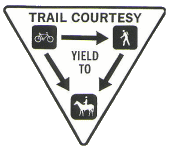 Trail Etiquette - The three types of traveler that will most likely use a non-motorized trail are hikers, bikers, and horses. When different groups meet on the trail, there are some commonly accepted rules of giving up the right-of-way so that an easy passing can occur.
Trail Etiquette - The three types of traveler that will most likely use a non-motorized trail are hikers, bikers, and horses. When different groups meet on the trail, there are some commonly accepted rules of giving up the right-of-way so that an easy passing can occur.
Bikers should yield to hikers and horses. Bikers have more control with easier ability to brake and accelerate after stopping. There is no danger of the bicycle becoming scared and bolting.
Hikers should yield to horses. Hikers can more easily step off the trail onto durable surfaces.
A few more trail etiquette guidelines to remember:
- A group hiking uphill has the right-of-way. They are working harder and need to keep a good rythm. Often, a group heading uphill will prfer to stop for a quick rest and let the downhill group pass them.
- A larger group has the right-of-way. A pair of hikers stepping off the trail will do less damage than a dozen stepping off.
- When hikers encounter horse, they should all step off the same side of the trail so the horse does not feel threatened from both sides. They should step off the downhill side of the trail to minimize their size and perceived threat. They should greet the lead rider and talk quietly and ask if the rider would like them to do anything differently. This lets the horse hear a human voice which may make it feel safer.
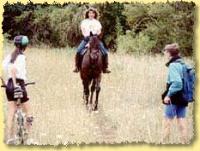 Tips on Being Considerate of Other Visitors
Tips on Being Considerate of Other Visitors
- Leave gates as you found them.
- Teach trail etiquette to everyone in your group.
- Incorporate gear color selection into your trip planning.
- Take a trip during the week instead of weekends when fewer people are out.
- Take rest breaks on durable surfaces well off the trail so others hiking by are not bothered.
- Pranks, stunts, and general goofing off is loud and bothers others, not to mention extremely dangerous in the wild.
- Be friendly and greet others you meet.
Being Considerate to Others is Important because:
- Leave No Trace ethical principles are passed on
- Your group makes a better impression and will tend to be more welcome in the future
- Everyone is entitled to enjoy the outdoors
Teaching Considerate of Others
- General Teaching Advice - good ways to get people to learn
- Game - Hiker, Biker, Horse - practice right of way
- Activity - Stealth Colors - blend in with the land
